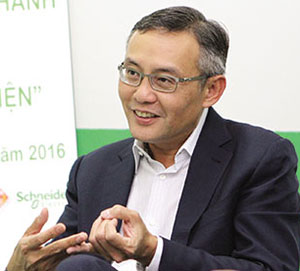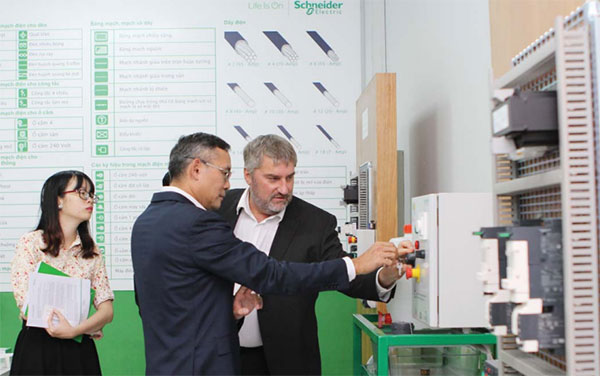Schneider Electric’s CSR programmes promote sustainability
 |
What is your opinion on the development of sustainable energy around the world and especially in Vietnam?
It is a sad fact that 1.3 billion people still do not have proper access to electricity and another 1 billion more have unreliable and intermittent supply of electricity. This means the world is still in great need of energy for life and development.
Another major issue is energy efficiency, especially as the world dashes forward in terms of urbanisation, industrialisation, and digitalisation. To facilitate these developments, energy consumption and electricity consumption are likely to increase by a respective 50 and 100 per cent in the next 20 years. It remains a burning issue whether we can cope with this and still prevent pollution.
So on one hand, we want to bring energy to more people and, on the other hand, we must reduce energy consumption or increase efficiency. It is a big challenge for the whole world and we must make sure that energy is safe, reliable, sustainable, efficient, and digitally connected.
Regarding Vietnam, I must mention the young population where the median age is only 35. This is really beneficial for the Vietnamese economy, but it also means the energy demand is growing high, which is estimated by 10 per cent every year. If energy capacity falls short of this demand, Vietnam will experience energy shortages like the Philippines, which makes it vital to invest in energy production and in energy efficiency solutions at the same time.
However, this leads us to an important question: where can Vietnam get more energy from, and should it rely on traditional sources, like coal and gas, or newer ones, like renewables? Economic development can easily lead to horrible pollution, as was the case in China. Vietnam has the latecomer advantage and the country should take a lesson on sustainability from its neighbours’ mistakes, so as to prevent similar environmental tragedies.
Do you think Vietnamese people and companies are aware of sustainable development? How can we raise awareness in the community?
Vietnamese economy has only grown truly quickly in the past 10 years, so sustainability is a new issue. That said, I think Vietnam is in a good position because the world has become more sophisticated in terms of energy management which means there are more solutions available for cherry-picking. I think to raise awareness in Vietnam, official standards should be launched and enforced. After laws are in place, Vietnam can offer incentives to encourage energy development.
 |
| At the new state-of-the-art “Green Electrician” lab at Ly Tu Trong Technical College in Ho Chi Minh City |
Can you describe Schneider Electric’s view on sustainability?
Our company’s brand strategy is “Life is On”, which means a good life and modern civilisation can only be “on” if energy is available. As a global specialist in energy management and automation, we want to bring energy to people who have limited or no access to it, especially those in remote areas. We believe that energy will transform their quality of life.
An important aspect for us in this journey is training electricians. When you look at the entire value chain, electricians play a huge role in introducing and expanding energy in remote areas. It is part of our corporate social responsibility initiative to improve the quality of education for future electricians.
If you look at the Dow Jones Sustainability Index, Schneider Electric is ranked 9th in the whole world and number one in our industry. After all, sustainability is not only about social responsibility programmes, it should be engrained in our corporate culture, business model, core values, products and solutions.
How will Schneider Electric implement this vision on sustainable energy here in Vietnam?
Schneider Electric makes heavy investments in developing markets, and our local programme in Vietnam is actually one of the most advanced, thanks to the great passion of our local team and partners. It is like a “push and pull” situation, where we “push” from the corporate level to launch programmes in Vietnam and we also receive the “pull” of commitment from our partners and team in Vietnam to introduce more projects.
As I have just mentioned, Schneider Electric believes in providing quality and hands-on vocational training for electricians. Currently in Vietnam, there are 1.4 million technicians entering the labour force each year, but only 15 per cent of them have formal education. This lack of training could lead to energy inefficiencies and electrical safety issues.
In response to this, we have just opened a €500,000 “Green Electrician” lab at Ly Tu Trong Technical College in Ho Chi Minh City, with the support of Schneider Electric Foundation, DEG (a subsidiary of KFW, the German Development Bank), and ASSIST, a non-governmental international capacity building organisation.
This project focuses on technical and vocational education in electricity, sustainable energy management, and entrepreneurship. The training programmes are directed towards the local youth to help them access stable employment opportunities. Schneider Electric and ASSIST will train the teachers of Ly Tu Trong Technical College until the end of this year, and the students will start their first courses in January 2017.
In addition to the Green Electrician lab, Schneider Electric also has the “Light It Up” project that brings electricity to rural communities across the Asia-Pacific region. In 2016, Schneider Electric Vietnam will provide Mobiya solar lamps to 275 Khmer households in Tan Loi village of the southern province of An Giang. The villagers are currently living off-grid with no sustainable sources of income. The solar lamps will be distributed to Tan Loi villagers via a sustainable entrepreneurship plan. Last year, we have already conducted a similar project in Ta Phin village of the northern mountainous province of Lao Cai.
| Schneider Electric - a global specialist in energy management and automation, with the support of the Schneider Electric Foundation, DEG - a subsidiary of the German Development Bank, and ASSIST - a non-governmental international capacity building organisation, opened the “Green Electrician” lab at Ly Tu Trong Technical College in Ho Chi Minh City on November 15, 2016. This lab will be used to train local youth within the framework of the project “Green Electrician, Education in Electricity for Employment” which aims to improve vocational training in the energy industry in Vietnam. This project focuses on technical and vocational education in electricity, sustainable energy management, and entrepreneurship. The training programmes are directed towards local underprivileged youth to help them gain access to stable employment opportunities. With state-of-the-art facility at the new lab, each year a minimum of 500 students are expected to get hands-on experience on energy training. |
What the stars mean:
★ Poor ★ ★ Promising ★★★ Good ★★★★ Very good ★★★★★ Exceptional
Latest News
More News
- Efficient technology solutions key factors in energy transition (September 25, 2024 | 09:00)
- Sao Do Group gears towards energy savings (December 07, 2023 | 12:01)
- Vice President Vo Thi Anh Xuan visits Copenhagen Infrastructure Partners headquarters (November 23, 2023 | 10:37)
- A wind turbine tower collapses in China (November 20, 2023 | 19:36)
- Vietnam has massive potential for offshore wind energy (March 17, 2023 | 16:29)
- Rooftop solar event entices EPC contractors and investment funds (March 09, 2023 | 07:50)
- GreenYellow acquires 49.5MWp solar farm of French IPP Qair in Vietnam (November 25, 2022 | 08:00)
- Eaton contributes to Vietnam’s low-carbon economy (November 20, 2022 | 19:00)
- Proposals to promote Vietnam's energy transition (November 12, 2022 | 22:02)
- How intelligent lights make cities smarter, safer and greener (November 04, 2022 | 09:00)
















 Mobile Version
Mobile Version